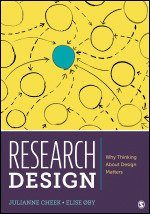Design Thinking and Research
In this research conversation with Janet Salmons, Julianne Cheek and Elise Øby discuss the importance of an iterative, design-thinking approach to research. They explain ideas from their new book, Research Design: Why Thinking About Design Matters.
Learn more!
Research Design: Why Thinking About Design Matters: This text engages in a dialogue with the reader, providing a serious but accessible introduction to research design, for use as a guide when designing your own research or when reading the research of others. You can preview two chapters, and use the code COMMUNITY3 for a 20% discoung, valid worldwide until 31/03/24..
Also, Dr. Cheek mentions the journal Qualitative Health Research, where she serves as the editor. This international, interdisciplinary journal contains many articles of interest to qualitative researchers, regardless of whether they are studying issues or settings in health care. While many of the articles are open-access, some will require library access.
More Methodspace Posts about Research Design
Whether you’re tackling a systematic review for your own research project, or supporting students, this recent Sage Campus webinar is an essential watch.
Dr Gemma Cherry and Dr Michelle Maden, co-authors of Doing a Systematic Review: A Student’s Guide, break down the rigorous process into 10 clear, manageable steps. You’ll learn the difference between systematic and scoping reviews, the critical need for a registered protocol, and how to craft a focused question using frameworks like PICO.
We’re excited to share that Research Methods - part of the 'Research Skills Toolkit' - has been updated to reflect today’s research landscape. Discover brand new content on Gen AI, Data Literacy and more – designed to support researchers with the skills they need in their careers.
There are some perennial challenges to doing a research project that all of us have faced: formulating a research question, wrestling with paradigmatic assumptions, keeping on track of a multi-year project. The Essential Guide to Doing Your Research Project has been helping students (and supervisors) for more than 20 years. But in a post-pandemic world with the transformations being wrought by artificial intelligence, datafication, and the rise and fall of social media platforms, there are new challenges facing researchers.
While progress has been made, social and systemic biases continue to produce inequities in scholarly reference lists, citational indexes, and even journal metrics. This guidance outlines steps that researchers can take toward achieving more inclusive and equitable scholarly citational practice.
We are thrilled to announce the launch of the Research Design and Planning video collection, a powerful new resource designed to equip researchers with the essential tools and insights to craft high-impact research projects. Whether you're a student, academic, or professional researcher, this collection is your go-to guide for mastering the art and science of research design.
Undertaking a research project such as a dissertation or capstone can be one of the most rewarding aspects of a student’s degree programme. It provides them with the opportunity to apply what they have learned in their course to explore a topic of personal interest. It also enables them to develop independent research skills, a sought after competence among many employers. However, for many students, the experience can also feel daunting and at times, overwhelming.
Join Gary Thomas, author of ‘How to Do Your Literature Review’ as he discusses questions which arose in his recent webinar, ‘What is a Literature Review in the Age of AI?’. A link to the webinar recording can be found at the end of this blog post.
Guest post from Christopher Lamont and Mieczyslaw P Boduszynski , authors of Research Methods in Politics and International Relations, on the importance of methodology in PIR research.
The new AI tools for conducting a literature review provide a remarkable resource both for professional researchers and students. They can rapidly scan millions of papers, provide digests and summaries in seconds, link cognate literature, and even draw maps of the literature showing how one piece relates to another.
While some types of online research use communication tools to interact with remote participants, digital methods use online approaches to study online phenomena.
This collection of open access articles offers multidisciplinary examples, guidance, and perspectives about online experimental research.
How do you know online participants are who they say they are? This collection of articles explores the issues - and solutions.
The wealth of material available online is irresistible to social researchers who are trying to understand contemporary experiences, perspectives, and events. The ethical collection and -use of such material is anything but straightforward. Find open-access articles that explore different approaches.
How to protect data when recording interviews on videoconference platforms.
The public is exposed to news stories about bad academic research behavior online. How can we counter this narrative and build credibility?
There are lots of questions to consider when using videoconference platforms for scholarly interviews.
Suggestions and resources to help you collect data with online interviews.
Researchers can easily access user-generated public videos. See this multidisciplinary collection of open access articles about quantitative and qualitative approaches to collecting and analyzing videos from YouTube or TikTok.
Let’s use this open-access research case to think through the possibilities and potential problems involved with studying blog posts and online discussions.
From the moment social media platforms began to welcome user-generated content, researchers have looked for ways to study it. Learn more with open-access articles about social media platforms.
Do you think about research questions as an insider, outsider, or somewhere in between? Why is positionality important in online research?
Julianne Cheek and Elise Øby, co-authors of the book Research Design: Why Thinking About Design Matters, discuss how to make decisions about what qualitative, quantitative, or mixed methods data to collect and how to do so. This post is the third of a three-part series of posts that feature ten author interviews.
What if we didn’t have to go fast to do our academic work and research? What if we could embrace the spaces and places around us to slow down? What could that mean for us personally, professionally, and in how we relate to social justice and ecological issues?
Doctoral student Sandra Flores discusses her research in Puerto Rico, and what she learned from the experience.
Julianne Cheek and Elise Øby, co-authors of the book Research Design: Why Thinking About Design Matters, discuss how to make decisions about methodology in this collection of video interviews. This post is the second of a three-part series of posts that feature ten author interviews.
Learn about action and participatory research methods, and ways to design and carry out research with, not on, communities.
Is it too hard to address problems in our complex world with one type of data? Mixed methods might be the answer. Find explanations and open-access resources in this post.
Chart research directions that take you to the roots of the problem. Learn more in this guest post from Dr. Donna Mertens.
We need to think about research before we design and conduct it.
Julianne Cheek and Elise Øby, co-authors of the book Research Design: Why Thinking About Design Matters, discuss the first three chapters in these video interviews:
Chapter 1 – Research Design: What You Need to Think About and Why
Chapter 2 – Ethical Issues in Research Design
Chapter 3 – Developing Your Research Questions































Informed consent is the term given to the agreement between researcher and participant. In this post Janet Salmons offers suggestions about the intersections of the Internet communications, ethics and participants.